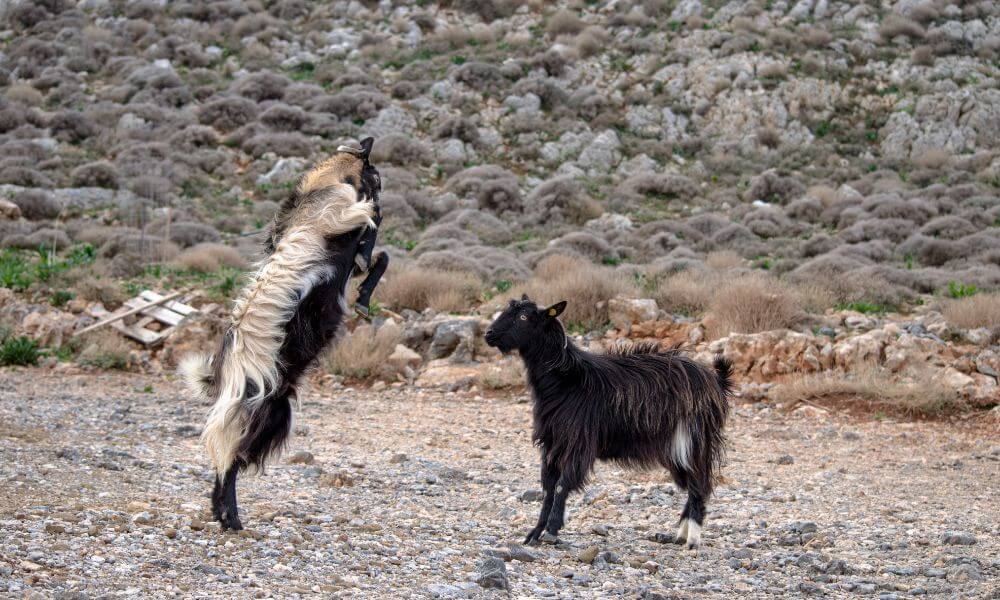Changing a goat’s behavior can often be a bit of an arduous task.
Often, though, what is happening is a young goat is coming into sexual maturity, and this can often make them less than friendly to their fellow goats.
There are ways to deal with it, though, so let’s look into it.

Why are my goats fighting?
There can be many reasons for it, depending on the context.
As I’ll get into later, there are some occasions where it is just play—most of the time, this won’t be the case, though.
Firstly, it is just partly in goat’s nature to fight, or at least to headbutt and bash one another.
For older goats, this is something they do to assert dominance over the younger members of the herd.
This is simply what goats do.
There’s not a lot you can really do about this behavior—it’s natural.
Sometimes, younger males will also develop “bullying” behaviors when they are going through adolescence.
This is one reason that males are often castrated, turning them into wethers.
This curbs aggressive behavior, although not entirely.
Males may also become aggressive when females are in heat, and begin bullying or attacking the females.
So, it’s important to know that goats fight because it’s simply in their nature.
They have a herd mentality, and a herd needs to have an alpha male and often an alpha female, too.
This is often asserted via fighting.
How to stop goats bullying each other
Firstly, it’s worth noting that in many cases, you won’t be able to really change the goat’s behavior.
As I said, it’s in their nature to fight and challenge one another.
They will simply do it because that’s what goats do.
How you can try to change the behavior will depend on the context.
In the case like above, your only option is going to be to separate the problem goats.
If you don’t have space for separate pastures, then there’s not really much you can do.
For females that are becoming bullies, one thing that is suggested is tethering them away from the herd for a short while.
They must, of course, still have shelter and adequate food and water.
This may change their attitude, but there’s really no guarantee.
Don’t leave them there too long, either, as this could just make it worse—a few hours at most.
As I said, it could be that the males are bullying a female that is in heat, because he is being driven a bit loopy by his own hormones.
In this case, you can separate the female until her heat cycle subsides.
Fundamentally, though, goats just have a bit of aggression in them—often even if they are neutered.
If you notice a bit of rough and tumble, and no one seems hurt, then you can just chalk it up to natural goat behavior.
Are my goats playing or fighting?
This is an important question to consider, as goats will frequently play by “fighting”.
They might give each other light headbutts, or ram into each other, in a playful and normal way.
That said, this is far less common than that they are actually fighting for some reason.
Whether it’s for dominance or something else, fighting is a natural part of being a goat.
So, all in all, it isn’t always something to worry about—but how long will it go on?
How long will goats fight?
Naturally, it depends on the context. For typical fighting, in which an older goat feels their position in the herd is threatened, it could go on for a few hours to days to weeks.
One goat in the herd will be the aggressor, trying to dominate the other goats or even just one other goat.
Eventually, they will stop.
For bullying does, though, often there really is nothing you can do to stop them from fighting.
They develop a tendency towards standoffishness and feel very threatened by virtually any other individual.
You’ll need to take careful note of their behavior over time to try and establish what the cause is, and by extension what the solution is.
It will often be different in every case.
Goats can be boisterous and domineering animals, then—this is natural in a herd mentality.
It can be difficult to accommodate in domestic settings, though, and there isn’t always something you can do to fix the behavior.
In most cases, though, there will be something you can do to at least curb the behvaior somewhat, though.
It starts with raising them right, normally, and trying to encourage the behaviors you want from day one.
This isn’t always possible, of course, so sometimes you may have to accept that you’re not able to look after a bullying goat.

Hi how do I stop my castrated wetherfrom bullying and mounting my baby goat who is only 2 weeks younger than the bullying one?
Please help the poor little man is scared to death
Thanks
Soo xx
I have 3 adult weathers who have been together since birth a pair of them are twins. I also have a 6 month old weather who is related.
One of the twins and the other older wether are bullying (cornering butting gouging) to the point of hurting the other wether I’ve separated him in sight for 3 days I keep trying to introduce him back but they keep targeting him.
He’s now frightened of them, the younger one joins in the bullying too.
I’m at a loss what to do!